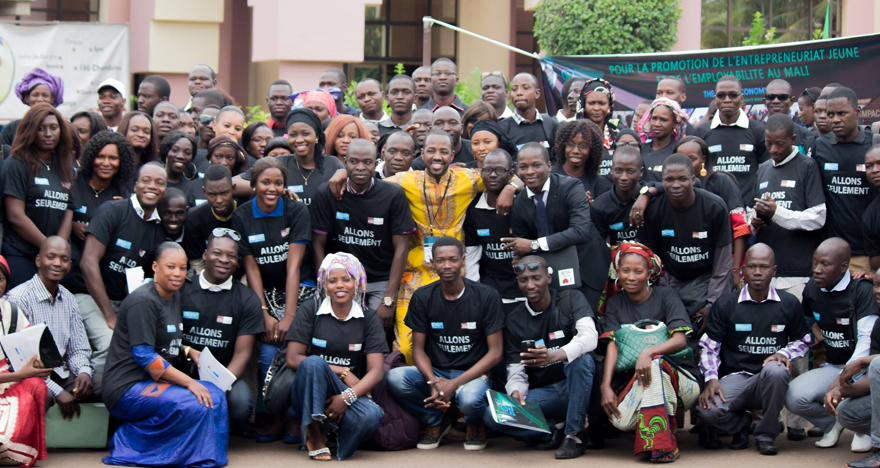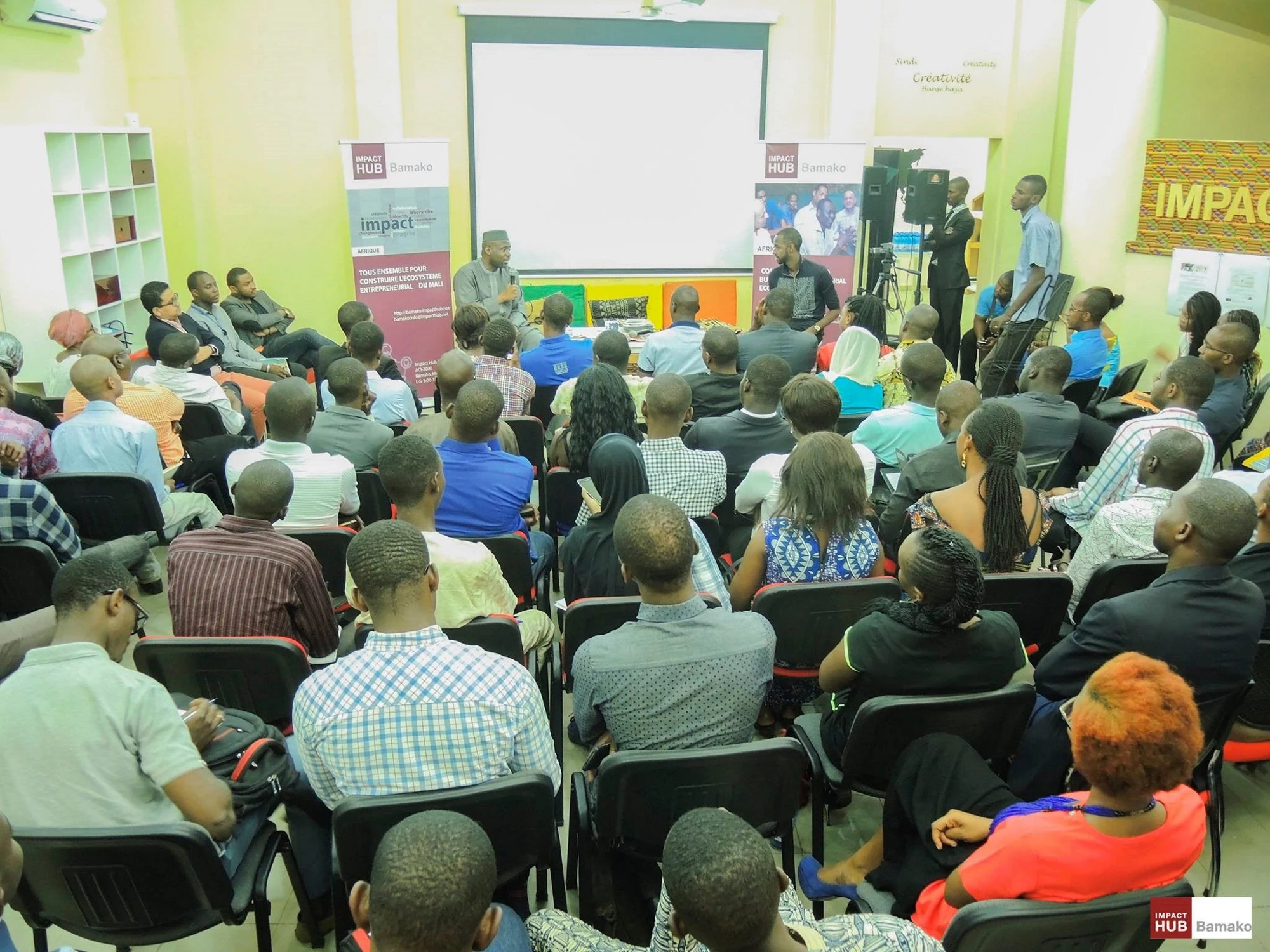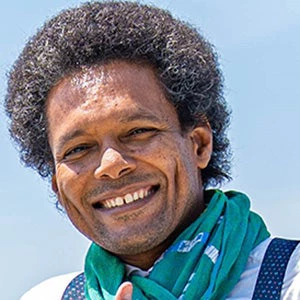Also available in: Français
Youth trained with The Next Economy methodology.
© Cesar Gbedema/Impact Hub Bamako
Last month, Impact Hub Bamako celebrated its first birthday. The first of its kind in Mali, Impact Hub Bamako is part of a global network of more than 15,000 members in more than 80 locations worldwide, from Bogota to Phnom Penh. Combining innovation lab services with incubator and accelerator programs and a center for social entrepreneurship, Impact Hub Bamako provides a unique ecosystem of resources, inspiration and collaboration opportunities for young, creative Malians working towards a common goal.
Co-founded by four young Malians — Fayelle Ouane, Kadidia Konaré, Mohamed Keita and Issam Chleuh — Impact Hub Bamako seeks to promote entrepreneurship and generate youth-driven solutions to Mali’s problems, as well as support women’s entrepreneurship and encourage social entrepreneurs to build a shared vision and work together for a collective impact.
“Establishing a community of young entrepreneurs was very important to us,” says Ouane, “so that everyone can build on and benefit from each other’s expertise and knowledge.” Indeed, Impact Hub Bamako hosts a diverse community of entrepreneurs, strategic advisors, architects, social workers, students, consultants, renewable energy specialists, and experts in agribusiness, ICT and corporate social responsibility.
By providing a shared space to work, as well as access to meeting rooms, events and that all-important internet connection, Impact Hub Bamako has given participants the opportunity to leverage each other’s expertise, as well as grow their professional networks not just nationally but globally, as Impact Hub boasts a multinational presence.
“This is our comparative advantage,” agrees Keita, now the hub’s director. “Our incubation/acceleration programs seek not only to promote the necessary conditions for job creation in our country, but also to professionalize our workforce and give them the tools to meet the demands of any employer.”
Impact Hub Bamako may be young, but it has been busy. In just one year, it has had a packed schedule, from hosting the MaliApp Challenge, which was funded by the World Bank, to launching a four-month incubation/acceleration program, The Next Economy. Impact Hub Bamako and other partners organized the biggest competition for mobile apps in the country that encouraged young people to present their innovative solutions in productivity, education, transport and finance.
CEO Talks including guest CEO such as Fatou Faye (Audacity Services), Seydou Coulibaly (Cira S.A.), Issiaka Ba dit Amkoullel (Woklo Barka), Mossadeck Bally (Azailai Hotels), Moussa Mara (Cabinet Diarra), Daouda Coulibaly (Trainis), Alioune Ifra N’Diaye (Blonda).
© Impact Hub Bamako
With the help of international partners, The Next Economy trains and supports 400 young people a year to improve their employability and abilities in entrepreneurship. After six months’ training, the beneficiaries of the program presented their projects at a Demo Day to a jury with prizes of up to $5,400. A five-month acceleration program, with a strong emphasis on identifying markets and marketing, ended with the 10 participants pitching their projects to potential investors and development partners.
“Getting participants to hone their business model and focus on the sustainability of their businesses is also a key objective of our programs,” adds Ouane. Finalists are already benefiting from Impact Hub’s support. Among the 10 start-up finalists, NG System currently earns up to $6,500 a month while Ady Services, a domestic workers agency, boasts more than a dozen clients. The regional Seedstars competition for start-ups in emerging markets, which takes place in more than 60 countries every year, was also hosted and organized by Impact Hub. Eight Malian candidates pitched their ICT projects and the winner was MED FAS, which allows doctors and patients to securely send and receive medical exam results via email and SMS.
Impact Hub’s outreach to local entrepreneurs doesn’t stop at competitions, however. The monthly CEO Talks event invites local businesses to give talks and provide a platform for budding and existing entrepreneurs to exchange ideas and benefit from each other’s experience and support.
In addition, UN Women’s FITIC program (Filles & TIC or Girls & ICT) is implanted at Impact Hub, which includes a 12-month training program in ICT skills for 17 young women with a special emphasis on using mobile technology to solve social problems at the community level. Panel discussions with women CEOs and UN Women representatives are tailored to women’s specific needs and constraints.
In partnership with Motorola Solutions, Impact Hub Bamako organized a MotoSecure Hackathon Day on innovation technology for security in which 12 young people presented and exchanged ideas and solutions to improve security nationwide. Finally, as part of Global Entrepreneurship Week, Impact Hub Bamako partnered with the U.S. Embassy to launch a webinar on entrepreneurship to inspire and support aspiring and existing young entrepreneurs as they seek to overcome the first hurdles they encounter in their markets.Partnering with the World Bank, the United Nations and the U.S. and U.K. embassies, among others, has also maximized the resources available to the incubator, including a fully stocked in-house library and English lessons for participants.
“Of course, there are some obstacles we can’t overcome alone,” warns Chleuh. “There are still very limited financing options for start-ups and SMEs, particularly with regard to equity financing.” Nevertheless, Impact Hub Bamako has come very far in such a short time. We can’t wait to see what they do next.
Links:



Join the Conversation